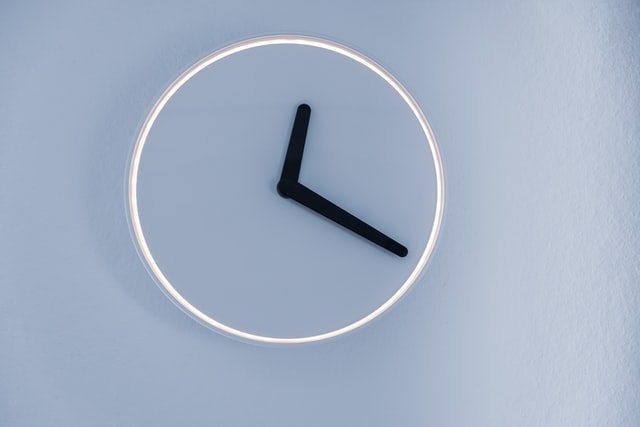“For everything there is a season, and a time to every purpose under the heaven.” ( Ecclesiastes 3)
Has the “time to heal” finally arrived?
Over the past turbulent year that saw the rise of the COVID-19 pandemic, time has acquired many new manifestations and meanings for us.
Time is akin to air; we can’t tangibly feel it. We think we have an endless supply of it and we are anguished when confronted with a lack thereof.
We go through life believing that we have an abundance of time on our hands. That which we cannot do today we believe we can accomplish tomorrow, next month, next year. A vacation, another academic degree and what not. We’ll get it done. Somehow. Some day.
Suddenly time froze in its tracks.
All of these plans seemed to have lost their value. No longer could we make new plans, travel, learn. Everything has come to a standstill. On the one hand, we seemed to have acquired a keener sense of time – anxiety tends to heighten one’s senses, yet on the other, mundane issues – including those defined by time – seemed irrelevant.
How much time passes from the moment one is tested for COVID until the results are ready? An eternity. In one fell swoop everything changed and our lives came to a halt. We isolate ourselves in fear of contracting the virus or infecting others, the anxiety growing.
Was this a lost year?
Entries disappeared from our daily planners. We could not properly mark time-defined events – birthdays and weddings, funerals and shivas – singular events that will never come around again; time-defined events that could not be acknowledged or celebrated and to which we cannot return (where have the Tokyo 2020 Olympics gone?).
Still, we did gain forms of time that were previously insufficiently familiar or did not receive the proper attention. The COVID lockdowns gave us more family time, more opportunities to spend time with loved ones, tipping our work-life balance in favor of life.
This gave us the opportunity for introspection that led to change, yet at times escalated tensions at home or at work and harmed the balance between the two.
After an initial period of reorganization, and thanks to technological advancements (Zoom), work began to permeate into our homes. Time was utilized more efficiently; we were spared the daily drive to and from work and precious time was saved. Suddenly our workday was distilled to just work.
We took this time leap together with the rest of the world; we conducted work meetings at home. We spoke to colleagues in Israel, Europe and the United States.
But everything has a downside and gradually but steadily, Zoom encroached upon our private – family – time.
Our work now pervades all hours of our day as urgent nighttime meetings are common and again our work-life balance is disrupted, tipping back towards work and away from our family time.
Who shall come to our aid?
In times of stress and anxiety such as we currently experience, and with demands to continue our essential work, some of us leaned on the knowledge of Mindfulness, the theory that teaches us to be present in the here and now, to live in the moment, to focus on the little things, to be there with our families, our tasks, our work and with others.
We are given an opportunity to stop the rat-race. To forget, just for a moment, painful past memories that haunt us, and resist yielding to worries about tomorrow. An opportunity to be present in the moment.
A purification of sorts of the dimension of time. A moment of calm on a quiet island in the midst of a stormy ocean.
Those who find no appeal in the practice of mindfulness can find solace in taking the time to enjoy getting their affairs in order, maintaining their daily routine and habits and performing tasks that are meaningful to them.
We all miss our former comforting routine, our reassuring daily lives, all of those little tasks and our familiar schedules.
A microscopic, unseen virus swooped down on the globe in a flash and bought our lives to a stand-still, silencing the din of clocks all over the world. Humanity came together and closed ranks against the disease and “shrunk” time to produce a vaccine in an unprecedented short period.
This is a world war against an unseen enemy, who has awakened in us all feelings of threat and danger – others are perceived as a threat of contagion and must be kept at a distance.
But physical isolation leads to loneliness and can lead to emotional isolation, something against which we must fight.
Soon we will be able to resume our former lives, but will we find ourselves back in the same place?
I believe not. This tremor in time we have experienced will serve us to learn lessons, deepen our understanding of ourselves, endeavor to focus on what matters and try not to waste time on trifles.
We have learned that we do not have all the time in the world and that the illusion of an endless supply of time is just that – an illusion. Time is indeed a limited resource and as such, our time is limited. Let’s put it to good use: with calm, self-realization, doing good and helping others.
May this episode come to a swift conclusion and may we take another step towards becoming a more peaceful, unified and caring society. May we replace distancing with closeness, and truly uphold the famous verse – “Love thy neighbor as thy self” (Leviticus 19).

Photo by Moritz Kindler on Unsplash
Get To Know The Author
WSL Prof. Yuval Melamed (2018) is Director of the Abarbanel Mental Health Center and Elected Chairman of the Israel Psychiatric Association.

